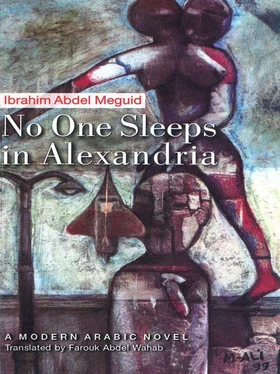Churchill gave a speech in which he praised Anglo-American cooperation, saying that they were in the sentinel tower guarding history. The air raids against Alexandria since Italy entered the war numbered one hundred, the most vicious of which was the six-hour raid and the two of the previous November. But the Italians had not come to drink Nile water; rather, they came as prisoners of war, as lost souls walking hundreds of miles on foot from Libya to Marsa Matruh. Many of them died on the road in the sun, the rain, and the desert winds. From Marsa Matruh, they were shipped by train or boat to Alexandria. The newspapers also reported on the trial of those accused in the case of the defective helmets supplied to the Egyptian and the British armies. It was a cause célèbre, widely covered in the papers and talked about everywhere, especially in cafés and bars. The Royal British Army and the Royal Egyptian Army had, at the beginning of the war, announced an invitation to bid on supplying fifty thousand helmets for Commonwealth soldiers and twenty thousand for Egyptian soldiers. The bid was won by a team of Egyptian and Greek contractors, who delivered the helmets on time. It turned out afterwards, however, that the helmets were fake, that they were all made of tin rather than steel, as was customary. In trying to excuse himself, one of the defendants said, “What good would a helmet, tin or steel, do against bombs from the air or against the big guns? Would a helmet protect a soldier or prevent his death if God had already decreed his death?” The case, and news of it, proved to be a welcome diversion for the Egyptians during the war. The trial was continued, as the defendants and the Egyptians had hoped. Kassala fell to the English, and Ethiopian troops and the Italians retreated to Eritrea, and Emperor Haile Selassie prepared to enter Ethiopia at the head of his national army. Al-Azhar celebrated the new year of the Islamic calendar. Ghaffara still put the anti-airraid fez on his face; he no longer traded in sawdust, as most lumber yards had closed down after the cessation of maritime trade with Europe. His customers, mostly shop owners, had also dwindled as a result of the great emigration. So Ghaffara removed the wooden box from his cart, leaving only one side panel, on which he wrote, “Capacity: ten tons. Ready to move migrants to the station with luggage or without.” He started to salute people in the manner of Goebbels, as he said, by raising his arm and saying “Heil Hitler” to everyone. At the end of January, Muhammad Mahmud Pasha, the former prime minister of Egypt known as “the Iron Fist,” died in Cairo. The soulful singer Malak opened in Butterfly in Brentania theater on Imad al-Din Street. In Greece, the great Greek leader General Metaxas died, and mourning was declared in the Greek Consulate in Alexandria and all Greek clubs. An order prohibiting bicycle riding in some streets in the capital was issued. Italians retreated to Benghazi and Churchill spoke in the House of Commons, saying that Egypt and Suez were saved. Cinema Misr screened the film Salarna’s All Right. The English began advancing on Tripoli. Italian tanks and armored cars were burned, Italian casualties and prisoners of war since the beginning of the British offensive totaled 150,000. Grief and muffled resentment of its mighty leader gripped Italy. Decorations went up everywhere in Egypt on the occasion of His Majesty’s birthday; music played in public squares, gala parties were held in Zaafarana palace, police-officers’ clubs, and the patriarchate. Restaurants were opened for the poor, and school children sang for our happy king. The dreams of Graziani to rule Egypt as a viceroy were shattered. A sublime royal directive announcing the campaign to combat bare feet was issued: “Barefootcdness is not a cause but a consequence. It is better for the citizen to buy, with his own money, shoes that would protect his feet. Giving him shoes out of charity takes away from his dignity and increases his humiliation.” At the same time the king donated the wild coney that he had caught to the Giza zoo. The newspaper ai-Ahram published an article to explain what a “coney” was:
“We have received from the Reverend Boulos Roman, from Asyut, a description of this animal. He said that it resembled a rabbit, that it chewed its cud but that it did not divide the cloven hoof, that it was one of the beasts that God ordered the Israelites not to eat, since they were unclean. He added that it was sometimes known as “the sheep of Israel,” that it lived in the rocks, and therefore was known for its wisdom. Solomon mentioned it in ‘Proverbs,’ saying, ‘There be four things which are little upon the earth, but they are exceeding wise: the ants are a people not strong, yet they prepare their meat in the summer; the coneys are but a feeble folk, yet make they their houses in the rocks; the locust have no king, yet go they forth all of them by bands; the spider taketh hold with her hands, and is in kings’ palaces.’ When the prophet David enumerated God’s mercy toward man, beast, and bird, he said that He created the rocks as shelter for the coneys. In some translations, the word ‘rabbits’ has been used, and even though they resemble each other, each was mentioned separately in the Bible, first the coney, then the rabbit. The fact that it was mentioned in the Bible tells us that it is found in abundance in Palestine.”
Humans, no matter how numerous, who among them
knows anything about himself?
Babylonian saying
There was a lot of work the last few days of winter, as cold air seared the faces in the early morning. The wind grew worse, especially after Magd al-Din and Dimyan went beyond the wall to the wide open space above the railroad tracks. There the month of Amshir had a chance to show itself in its true colors, as eddies whirled the dust suddenly, letting loose the cold wind, after which crazy rain poured down from a cloud that had raced in from some distant place. On their usual morning route, Magd al-Din and Dimyan no longer felt provoked by the silent operator of the Raven, who still stared at them. Dimyan noticed that the man had grown a beard and now was rarely ever seated, but instead was constantly walking back and forth. Dimyan asked Magd al-Din whether the man had actually gone crazy. Magd al-Din gave him his usual, vexing response, “Leave the creation to the Creator, Dimyan.”
The workers had the task of completing a two-kilometer extension of the rail line, as the present lines could not accommodate all the trains waiting to enter the harbor. The two direct long-distance lines to and from the desert also had to be clear of all other trains.
The open area extending behind Alexandria, from Muharram Bey to Qabbari and passing by Ghayt al-Aynab and Kafr Ashri, was crowded with hundreds of cars and dozens of black steam engines that never stopped moving. They carried weapons from the harbor to the desert, or weapons and soldiers coming from Suez, or those that had been on furlough in Alexandria, as well as prisoners of war. Several trains arrived from the Cairo warehouses with dozens of flatbed cars carrying crossties, rails, and thousands of huge screws and nails, as well as the square steel plates placed between the cross ties and the rails. Trains coming from the Western Desert brought huge amounts of ballast. The area was suddenly filled with railroad policemen in their distinctive yellow uniforms, stationed near and around the equipment unloaded by the workers and the winches moving on rails. The workers, numbering over a hundred, gathered from all the posts to take part in this giant task that had to be finished in record time, even if they had to work day and night.
Despite their woolen outfits, the cold assailed the workers at the neck, sleeves, and hems of their pants. The heat of working was no longer enough to give them warmth, as the wind and the open space gave them no shelter. No one was allowed to take a lunch break, now reduced to one hour, at home. The workers accepted all this hardship, bothered only by the intermittent downpours. The rain forced them to run and take shelter next to or under the nearest car, but as soon as they returned to work, it came down again. On several occasions they made light of it and stayed at their work posts, but it would surprise them by coming down longer and harder. They found themselves obstinately matching wits with the rain.
Читать дальше












